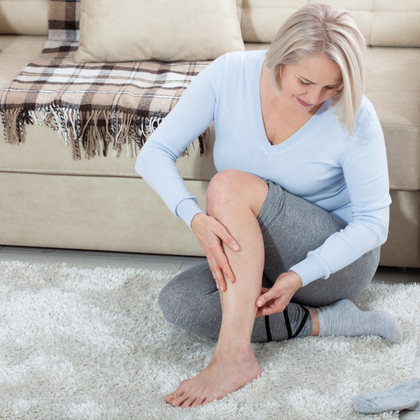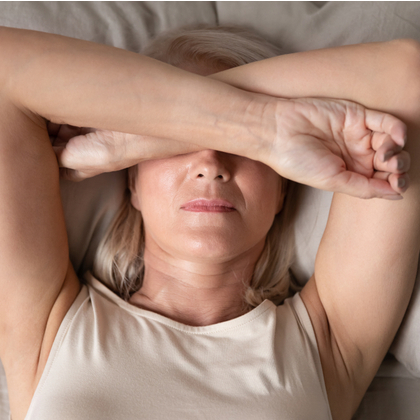
Besides the traditional menopausal symptoms — hot flushes, insomnia and mood changes — some women may also contend with hair loss. Hair loss can be particularly upsetting and can significantly affect your confidence.
Menopausal hair loss is more common than you think.
It’s estimated that 40 per cent of women experience it in the menopause (1). This condition isn’t permanent and there are plenty of ways to support hair growth naturally.
Here, we take a look at the causes of menopausal hair loss and how best to manage it.
What happens to your hair during menopause?
As you enter perimenopause, your production of the female sex hormones oestrogen and progesterone starts to decline unevenly. Aside from supporting other areas of health, including the cardiovascular system, bones, and sleep, these hormones also help hair growth and keep it on your head for longer.
 As oestrogen and progesterone drop, hair growth is slower and hair becomes thinner than before. Over time, the decline in these hormones triggers an increase in the male sex hormone, testosterone, which causes hair follicles to shrink (2).
As oestrogen and progesterone drop, hair growth is slower and hair becomes thinner than before. Over time, the decline in these hormones triggers an increase in the male sex hormone, testosterone, which causes hair follicles to shrink (2).
Slow, progressive hair thinning can lead to female pattern hair loss (3). The first signs may be increased hair shedding when brushing or washing, hair thinning, or dry and brittle hair. It’s possible that your parting may widen, too.
How do you know if your hair loss is hormonal?
While the hormonal changes associated with menopause may play a role in hair loss, it’s not the only trigger. Other factors, like stress, diet, medication, thyroid function, and certain illnesses, may also contribute to hair loss.
Stress, for instance, may drive hair follicles into a ‘resting’ phase, so they are unable to produce new hair strands (4). In this, hair can fall out more easily, even if you’re combing or washing it. Sometimes, the stress and anxiety of menopause can itself be a trigger.
Cancer treatments are also widely known to cause hair loss. As chemotherapy medication attacks rapidly dividing cancer cells, it also attacks other fast-growing cells in the body, including those in hair roots (5).
Is hormonal hair loss reversible?
While hair loss can be distressing for women, in some cases leading to low mood, anxiety and social self-exclusion. Menopause-related hair loss is not permanent (6).
A multifactorial approach can promote new hair growth and regain your confidence.
How can I stop hair loss during menopause?
Limit stress
Due to hormonal fluctuations, you may experience mood swings and anxiety during the menopause, so managing your stress levels is vital throughout — not only because it supports hair health. Try to make time for relaxation every day to calm your nervous systems, you could try yoga, mediation, breathing techniques or regular exercise.
Be gentle with your hair
Try to be gentle with your hair. Avoid pulling your hair back in tight styles as this can strain hair follicles and always use a good quality shampoo and conditioner when washing your hair, to keep your scalp healthy. Make a conscious effort to wear a hat in the sun to protect your hair from UV damage. Lastly, we recommend avoiding heat tools, like hair straighteners and curling tongs, as they may weaken and damage your hair.
Hormone Replacement Therapy (HRT)
HRT may slow down hair loss, or, in some instances, stop it altogether (7). However, it’s hard to be certain if HRT will always help and hair loss could deteriorate despite taking HRT.
Increase your iron intake
Low iron levels are the leading risk factor in the development of a condition called Chronic Telogen Effluvium (CTE) amongst women, which is characterised by increased hair shedding (8). Poor iron stores usually result from the loss of blood during your period, especially if you have heavy periods, which can occur in perimenopause.
There are a few ways in which you could increase your iron intake:
-
NutriHair® — a specialist multivitamin that packs 20mg of iron to support hair growth.
-
Try to have one serving of red meat each week if it’s part of your diet.
-
Increase your dietary intake of plant iron sources, such as pulses, dark green vegetables, and dried fruit.
-
High vitamin C fruit and vegetables support the absorption of iron into your bloodstream.
-
Multi-Guard® Active or Iron 14mg as Citrate — vegan-friendly supplements, all of which contain relevant levels of iron at 14mg and should help achieve the recommended daily allowance of 14.8mg for adult women.
Up your zinc
Zinc has unparalleled benefits for hair health.9 You should increase your intake of zinc-rich foods, like whole grains, beans, nuts, and red meat. Also, as an insurance policy you should consider taking a single supplement or multivitamin that delivers 15mg of zinc.
We understand that navigating hair loss in menopause can be distressing. However, with the simple lifestyle and nutrition advice above, it’s certainly possible to support new hair growth.
If you want to learn more about managing menopause, please explore the rest of our Menopause hub
References:
-
My Menopause Doctor. (2020). Menopause And Hair Loss By Consultant Dermatologist, Dr Sajjad Rajpar. Available online: https://www.menopausedoctor.co.uk/menopause/menopause-and-hair-loss-by-consultant-dermatologist-dr-sajjad-rajpar#:~:text=Some%2040%25%20of%20women%20will,or%20occur%20many%20years%20after.
-
Goluch-Koniuszy ZS. Nutrition of women with hair loss problem during the period of menopause. Przeglad menopauzalny = Menopause review. 2016;15(1):56-61.
-
Blume-Peytavi P. et al., S1 guideline for diagnostic evaluation in androgenetic alopecia in men, women and adolescents. British Journal of Dermatology. 2010;164(1):5-15.
-
Hadshiew I. et al., Burden of Hair Loss: Stress and the Underestimated Psychosocial Impact of Telogen Effluvium and Androgenetic Alopecia. Journal of Investigative Dermatology. 2004;123(3):455-457.
-
Breastcancer.org. (2020). Why And How Hair Loss Happens During Breast Cancer Treatment. Available online: https://www.breastcancer.org/tips/hair_skin_nails/hair_loss
-
David. D., Callender V., Review of quality of life studies in women with alopecia. International Journal of Women's Dermatology. 2018;4(1):18-22.
-
My Menopause Doctor. (2020). Menopause And Hair Loss By Consultant Dermatologist, Dr Sajjad Rajpar. Available online: https://www.menopausedoctor.co.uk/menopause/menopause-and-hair-loss-by-consultant-dermatologist-dr-sajjad-rajpar#:~:text=Some%2040%25%20of%20women%20will,or%20occur%20many%20years%20after.
-
Rushton GH. Investigating and managing hair loss in apparently healthy women. Canadian Journal of Dermatology. 1993;5:455-461.
-
Hadshiew I. et al., The therapeutic effect and the changed serum zinc level after zinc supplementation in alopecia areata patients who had a low serum zinc level. Annals of dermatology. 2009;21(2):142-146.
You Might Also Like
Disclaimer: The information presented by Nature's Best is for informational purposes only. It is based on scientific studies (human, animal, or in vitro), clinical experience, or traditional usage as cited in each article. The results reported may not necessarily occur in all individuals. Self-treatment is not recommended for life-threatening conditions that require medical treatment under a doctor's care. For many of the conditions discussed, treatment with prescription or over the counter medication is also available. Consult your doctor, practitioner, and/or pharmacist for any health problem and before using any supplements or before making any changes in prescribed medications.

Olivia
Olivia Salter has always been an avid health nut. After graduating from the University of Bristol, she began working for a nutritional consultancy where she discovered her passion for all things wellness-related. There, she executed much of the company’s content marketing strategy and found her niche in health writing, publishing articles in Women’s Health, Mind Body Green, Thrive and Psychologies.
View More



